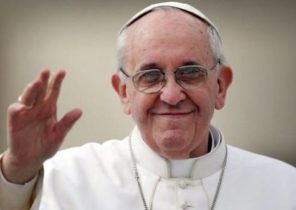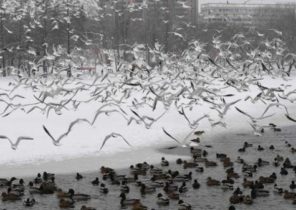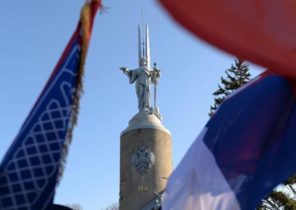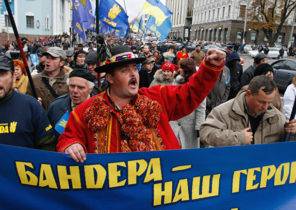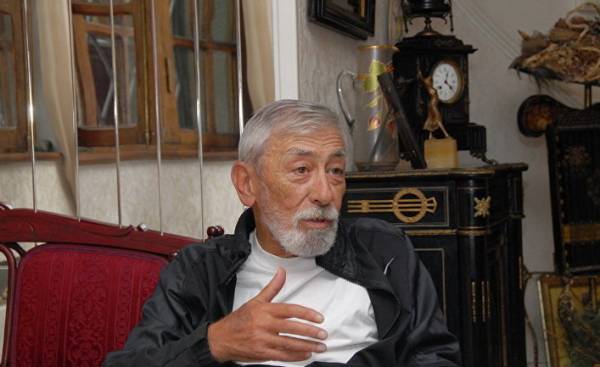
!– —>
After a brief Russian-Georgian war in 2008, Vakhtang Konstantinovich, a few months went with a sheet of paper on which was written the text of the future songs, but which has not yet had a melody. For one of the most popular actors this was probably the main song of life: he has refused the Russian order of Friendship, have said many times that I will never go to Russia, where he lived for decades and where he passed most of his creative biography.
The first days of the war, I came to Buba Kikabidze, and he told me as he instantly forgot all Moscow “friends” that have recently fawned and vowed to love and eternal friendship. They watched the reports Russian TV was turned from friends into enemies: the polls show how quickly the Russians believe in the propaganda tales. Now if they did not Express hatred Kikabidze, to the once beloved “Mimino”, remained stubbornly silent, trying not to notice.
Vakhtang Kikabidze — a strong man, he poured us a brandy, we clinked glasses, and he talked about mental testing. Six months later, the song was written, it was filmed and everyone finally realized what Georgians think about Russia — they are “disappointed”. It is not hate, the Caucasus hatred is a terrible mental state “krovniki”, seeking revenge for the death of relatives. Hatred is hard to control, almost impossible to persuade it not to retaliate, so Buba as the Georgians later, chose the Caucasian attitude to those friends who easily crossed into the enemy camp: the Russians are disappointed, and disappointment, perhaps worse than revenge — not blood for blood, and eternal contempt.
One morning, in one of the days of the war, I went to the shop to buy water and biscuits. I saw an elderly woman who came over and in perfect Russian, know how Tbilisi aristocrats, said, “Son, if there (points North) think that we, Georgians, are bad, why are they worse than us?” This question is bugging me for nine years. It is simple, from the past life, as in the clip Buba, when the Russian poets arrived in Tbilisi, to read his poems about Georgia, swore in loyalty and love, ate barbecue and drank wine, walked under umbrellas on the promenade of Sukhumi, and now they and their descendants Georgia was cursed. Why?
Imagine that Georgia actually decided to attack Russia, which it more than 246 times, whose population is more than 36 times, and one of its 58th army is 120 thousand people, while the entire Georgian — only 35 thousand. Hard to imagine? Similarly, nine years ago, the Georgians could not imagine that Russian “peacekeepers” will be shooting at the Georgian police, and what later became known as 2 August, a week before the war, in the administrative center Tskhinvali region (the Russians of South Ossetia), Tskhinvali profit column of the Russian military, percolating through the nearly 4-mile Roki tunnel with one-way traffic and without ventilation. And that all this will be done below on the morning of 8 August, Russia announced in response to the “attack” of Georgia, the 58th army came to help “peacefully sleeping Tskhinvali”.
You have to dig into the facts and versions of the August war, but one can be assured that it was necessary in Russia and did not need Georgia. If after the “protection” of Tskhinvali, she managed to conduct an operation “peace enforcement” across the country, as planned, the Kremlin got control over all of Georgia, as it was 200 years ago.
If after the “protection” of Tskhinvali, she managed to conduct an operation “peace enforcement” across the country, as planned, the Kremlin got control over all of Georgia, as it was 200 years ago
Still remember the old man on the Batumi Bazaar, talked about the war after two or three years: he recalled that the history of Georgian statehood more than three thousand years, and Russia’s attempts to make Georgia part of their territory the last two hundred years lead to nothing. In 1801, the Russian Empire violated the Treaty of Georgievsk of 1783, capturing Georgia, banning the monarchy and abolished the autocephaly of one of the oldest on earth the Christian churches.
The first decades of the occupation of Georgians each year uprisings that Russian troops brutally suppressed. Therefore, the Declaration in 1918 the independent Democratic Republic of Georgia was the desire of the people, and not so much the whim of the Mensheviks, which was ahead of the Communists.
In 1920 a contract was signed with Russia, which it broke six months later, in February 1921 the Red army a second time invaded Georgia. Then there was repression, and the unwanted link, emigration and constant excitement, people resisted Russia 200 years — who by force of arms, who demonstrations and rallies. For a while the excitement abated, Georgia came Russian poets and writers, wrote their books admiring, and then everything came back — the Kremlin once again took reprisals, trying to pacify and tame the Georgians.
For Russia, Georgia was not only beautiful and delicious, but also the Imperial diamond — from the ancient culture and traditions, to capture, to occupy and subjugate which has always been a matter of honor for any Russian Tsar, General Secretary or current President. Are Russia’s Imperial tradition — to seize much less across the country to indulge their vanity.
All these two hundred years Russia has been lying, using propaganda to hold the struggling Georgia. In the 19th century, until it was television and radio, propagandists “glory of Russian arms” was poets and writers who come to the Caucasus and their works podbadrivaya Russian lines about “timid Georgians fled” or “evil Chechens”, how valiant Russian army has invaded, occupied and annexed it, calling it a “gathering of Russian lands”.
Georgians did not want to be Russian, despite the prohibition to pray in churches in the Georgian language, learning the native language, to publish books and Newspapers. In 1978, the whole country rose up against the desire of the Communists to amend the Constitution of the Georgian SSR and to make the state Russian language. Mass demonstrations were held in Tbilisi and other cities. Then there was the action of 9 April 1989, brutally dispersed by the Soviet army.
The 2008 war was to take place in any case — Putin is rebuilding the Empire, and Georgia was the first victim. Just because Georgians did not want to be conquered: “pacify” Georgia, Putin would be easier to deal with others. In 2005, he suggested the new President Saakashvili to end the relationship with NATO and back under the Kremlin’s shadow, he refused.
Since that time, began to happen strange events, in January 2006, it was blown up a gas pipeline of Mozdok-Tbilisi in the dead of winter without Russian gas left Georgia and Armenia, in the same year, deported Georgians from Russia, banned imports of wine and fruits.
A year later, on 8 November 2007, the Russian oligarch Badri Patarkatsishvili was the first attempt of a coup. After the failure it was decided to capture Georgia for a few months before the war, different experts and politicians has made no secret of his desire, the Agency REGNUM on 13 June 2008 published the analytical report “prospects of war in Transcaucasia and Central Asia”:
“Today, the priority practical and tactical challenge of the West in the region is the implementation of the project of the Transcaspian pipeline that could feed a pipeline artery through the Azerbaijan-Georgia-Turkey, and download the transit capacities of the Georgian ports… Policy of the United States and its allies in the Caucasus have become quite consolidated the rejection of Russia, Iran and Turkey. Azerbaijan, Armenia and Georgia will eventually have to choose your path depending on the outcome of this positional struggle: or to build your own strategy on your own risk, or to become “bargaining chips” of the American strategy of “containment”, the responsibility for which will not incur neither the United States nor Russia nor Iran”.
Had to find a pretext for war against Georgia — it found those who have already worked for many years over the separatist projects of the Kremlin. So the “victim” was “peacefully sleeping Tskhinvali”. 30 Jul 2008 Russian railway troops had completed the repair of the railway on the territory now occupied Abkhazia since mid-July in the North Caucasus began large-scale exercises of the Russian army “Caucasus-2008”. In the General staff of the armed forces planned large-scale military operation in two directions — from Tskhinvali and Abkhazia.
So began a war of two fronts was to cut the country into two parts — East and Georgia, the train was already several dozen Russian officers from ethnic Georgians who were recruited all over Russia, so they were the commandants of the occupied territories. If not for the intervention of George Bush, no one would have come up with scary stories about “Georgian fascists”, the operation was planned to be completed in a few days, forcing Saakashvili to flee or arresting him.
The Kremlin is hurried — in 2008, the Georgian society was ready to see the country integrated into the EU and became a NATO member. Years later, the percentage of euroatlantische and evrointegratorov not decreased, even increased received support in Brussels and in Washington, Georgia finally decided to break its relationship with Russia.
Now the clip Buba Kikabidze remember how the first reaction to war, now against Russia more pragmatic. The emergence in Georgian politics of another Russian oligarch, Bidzina Ivanishvili, did not change the attitude of Georgians to the West, and this means that Russian influence is not as dangerous as nine years ago.
During the years of Saakashvili’s rule in Georgia, there have been many changes in education and the state system, in relation to the population of the country and to aggressive neighbor. In Georgia every year, fewer people who like the older generation, even connect the life with Russia. Georgian youth in the majority of other aspirations and values — to enter a Western University, to get a prestigious education, to develop reform. For the nine post-war years the attitude of Georgians to Russia has changed radically: there is no hatred, only pragmatism: a tourists — please, tanks and bombers — no.
“Disappointment” is not just pretentious post-war mood of the inhabitants of Georgia, and it is pragmatism in the future and, most importantly, the distrust of Russia as a state. There was too much blood and deceit in relations since 1801, and now Russia will not save propaganda, she did not touch the residents of Georgia. By the way the Georgians since the end of 2013, actively supported Euromaidan and the Ukrainian support in the war in the Donbass, it is safe to say Ukraine is part of the history of joint struggle against the Russian invaders, a mutual desire to become Europeans. With Russia linked to war and occupation since 1801, the constant desire to subdue the Georgians.
Unfortunately, the little Georgia was not able to change Russia nine years ago, though, and caused serious damage to the Kremlin’s military ambitions, and the passivity of the West only spurred Putin, so Ukraine is now suffering. However, the 2008 war has started the countdown Imperial attempts of the Kremlin. It seems the West finally realized that Moscow should be put before a choice — either Russia becomes a normal country, or it disappears, as the disappeared Soviet Union. Of course, this will not happen today or in a few years, but geographically-criminal education OPG “Russia” it will not be the same as it was delivering a huge number of troubles of its neighbors.



